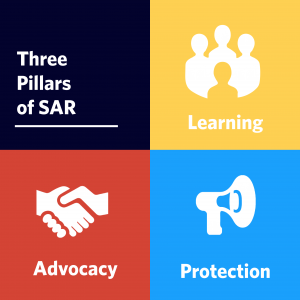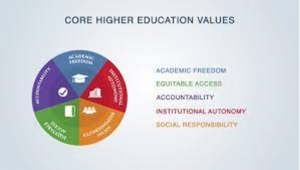The HRC supports Scholars at Risk (SAR) Network’s international initiative for advocacy, protection and learning towards academic freedom and the respect for scholars’ human rights. We focus primarily on the learning and advocacy arms of the Scholars at Risk mandate and complement the protection work carried out under the VP International.

The Collective’s work on academic freedom includes
- Supporting UBC faculty who integrate SAR projects into their courses
- Designing and implementing co-curricular engagement opportunities for students to research and advocate for academic freedom
- Organizing public events
Scholars at Risk (SAR) is an international network of higher education institutions and individuals dedicated to protecting scholars suffering grave threats to their lives, liberty and well-being for reasons of academic freedom and human rights.
In addition to being an advocacy network, SAR is primarily an academic network founded on the principles of equitable access to intellectual activity and the pivotal role of the university in keeping critical enquiry open.
With more than 21 Canadian institutions joining 500 member institutions worldwide, SAR initiatives across Canada exemplify the import and impact of protecting scholars and the freedom to think, question and share ideas.
There are several definitions of academic freedom. Canadian Association of University Teachers (CAUT) states,
“Academic freedom includes the right, without restriction by prescribed doctrine, to freedom to teach and discuss; freedom to carry out research and disseminate and publish the results thereof; freedom to produce and perform creative works; freedom to engage in service; freedom to express one’s opinion about the institution, its administration, and the system in which one works; freedom to acquire, preserve, and provide access to documentary material in all formats; and freedom to participate in professional and representative academic bodies. Academic freedom always entails freedom from institutional censorship.”
For more information, see their full 2018 statement.
Academic freedom is linked to the fulfillment of the purpose of academic institutions’ search for, dissemination of, and transfer of knowledge. It therefore requires academic institutions to define this freedom specifically within the context of the institution, its values, and priorities; committing to specific definitions of those concepts and assigning varying urgency to them.
Academic freedom is crucial to the role universities and educational institutions play in our society. It is important for the pursuance of knowledge, truth and critical inquiry by the university, faculty, staff, students and the broader academic community. It is important that everyone involved in academic pursuit is able to do so freely, ethically, autonomously and with integrity.

It is important to note that Academic Freedom is just one of several core values that we hold as institutions of higher learning. Other values such as Equitable Access and Social Responsibility must also come into play when we engage in discussions and debates on Academic Freedom on our campuses. You can learn more about the relationship between these values here.
Academic Freedom at UBC has been defined and reinforced in a number of ways. The history of UBC’s approach to academic freedom and its latest statement on the topic can be found here. It affirms that
"The members of the University enjoy certain rights and privileges essential to the fulfilment of its primary functions: instruction and the pursuit of knowledge. Central among these rights is the freedom, within the law, to pursue what seems to them as fruitful avenues of inquiry, to teach and to learn unhindered by external or non-academic constraints, and to engage in full and unrestricted consideration of any opinion.
This freedom extends not only to the regular members of the University, but to all who are invited to participate in its forum. Suppression of this freedom, whether by institutions of the state, the officers of the University, or the actions of private individuals, would prevent the University from carrying out its primary functions.
All members of the University must recognize this fundamental principle and must share responsibility for supporting, safeguarding and preserving this central freedom. Behaviour that obstructs free and full discussion, not only of ideas that are safe and accepted, but of those which may be unpopular or even abhorrent, vitally threatens the integrity of the University’s forum. Such behaviour cannot be tolerated."
Interested in learning more about academic freedom, including its limitations, responsibilities, and linkages with other human rights? Check out our upcoming events and past work, such as the Academic Freedom in Canadian Higher Education 2021 Report by Go, Houston, Kim, Liu, Mendoza, Phuong, Roger, and Soebroto.